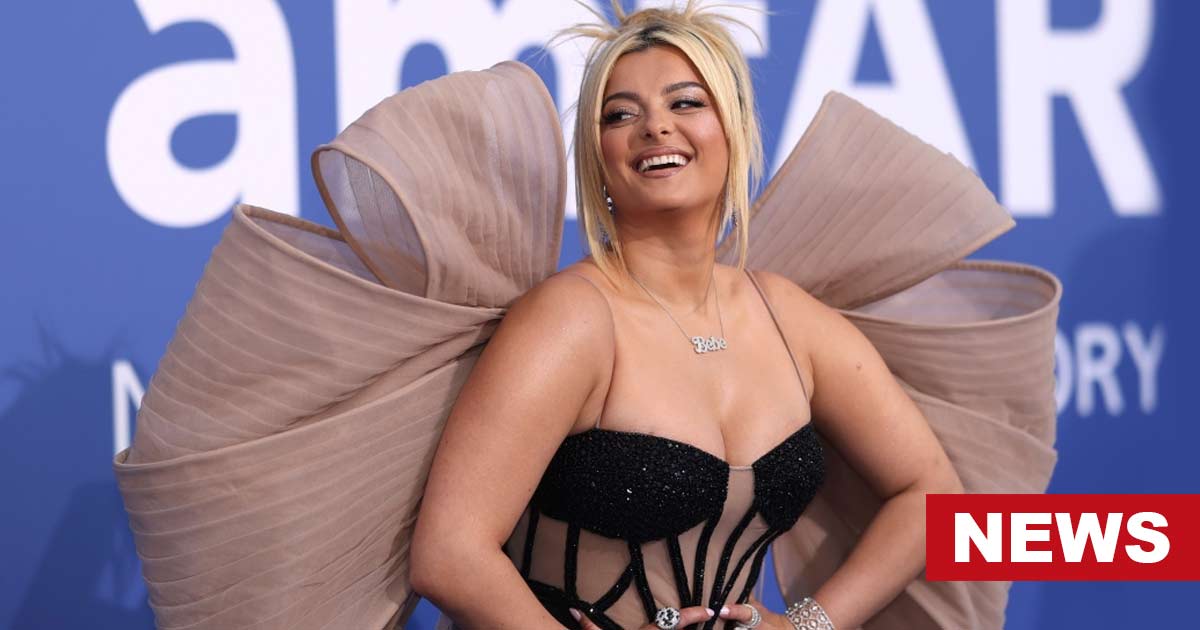Bebe Rexha’s accident at a concert has garnered headlines for all the right reasons. The pop sensation experienced a distressing incident during a concert in New York when a fan threw a phone at her, striking her on the head. The aftermath of Bebe Rexha hit by a phone in the face saw the star collapse to her knees in pain.
Promptly, she was taken off stage, her hands shielding her face as she grimaced. Disturbing footage circulated online, capturing the moment when security removed a man from the crowd as outraged fans voiced their disapproval, denouncing the act as assault. Following the incident, the New York Police confirmed that they had pressed charges against the 27-year-old concertgoer responsible for the attack.
Pop star Bebe Rexha, known for her chart-topping hits like “I’m Good (Blue)” and “Meant To Be,” bravely shared images of her injuries on Instagram the following day. The photos displayed a bruise around her left eye and a cut on her eyebrow.
Despite the visible harm, she reassured her fans by captioning the pictures with the words “I’m good” and offering a thumbs-up gesture. Reports from the gossip website Pop Base cited Bebe Rexha’s mother, who stated that the singer had received medical treatment and required three stitches.
Many fans and well-wishers have commented on Bebe Rexha’s Instagram post, criticizing the extremes of toxic celebrity worship, obsessed fandom, and the parasocial relationship between celebrities and their fans.
One fan, commenting on Bebe Rexha’s NYC concert accident, said: “[Concert] etiquette is practically nonexistent and it needs to change. especially the way “fans” treat the artist they paid to see. i hope you heal quickly :-(”Bebe Rexha’s accident serves as a reminder of the potential dangers associated with such reckless actions during live performances. Artists deserve respect and support from their fans, rather than being subjected to harm. Concertgoers should prioritize the well-being of the performers and contribute to an enjoyable and safe environment for all.
Unfortunately, the act of throwing objects on stage has become an increasing trend among fans, motivated by the desire to capture a selfie with the artists and potentially retrieve their tossed phones. For instance, much like Bebe Rexha’s NYC concert fiasco, in Los Angeles, Harry Styles was struck in the eye mid-concert by a handful of Skittles—leading him to rinse his eye with water for the remainder of the show.
N-Dubz star Tulisa had her sunglasses knocked off by a fan’s phone during one of the band’s reunion gigs in Glasgow. As far back as 2004, David Bowie confronted a fan at a Norwegian music festival after being hit in the eye with a lollipop.
Why Fandom Can Sometimes Hurt Its Own Heroes
This isn’t the first time fans have hurt their celebrities physically and mentally. For example, after the alleged feud between Selena Gomez and Hailey Bieber dominated headlines and resulted in death threats, Bieber took to Instagram to slam fans leaving disturbing comments on Gomez’s posts.
She wrote: “If you’re leaving mean or rude comments on my behalf on anyone’s posts, just know that I don’t want that, nor do I ever or will I ever support or condone hateful, mean, or nasty comments … Doing that is not supporting me. If you are participating in that, you are a part of a culture that I want no part of. Please be nice, or don’t say anything.”
Similarly, Taylor Swift’s fans have been criticized for their obsession with the singer’s personal life and for delivering dangerous threats to her so-called ex-boyfriends, the subject of her songs.
Earlier this year, Californian rapper Doja Cat failed to perform at the Asunciónico festival in Paraguay due to bad weather. Her fans gathered outside her hotel to protest her absence, besides taking to Twitter to show their displeasure. Fed up, the rapper tweeted: “This shit ain’t for me so I’m out. Ya’ll take care.”
The world of celebrity culture often witnesses the extremes of celebrity worship, obsessed fandom, and the fascinating yet complex dynamics of the parasocial relationship between celebrities and their devoted fans.
From the passionate adoration bordering on obsession to the intimate connection fans feel with celebrities they have never met, these phenomena demonstrate the immense influence and impact that celebrities have on their followers.
However, as seen in the above instances, fandoms have the potential to harm their heroes through obsessive behavior, invasion of privacy, and toxic actions like bullying and spreading false rumors.
Unrealistic expectations from fans can also hinder an artist’s personal and artistic growth, pressuring them to conform instead of exploring their own vision. But. it’s important to recognize that not all fandoms engage in negative behavior, as many fans provide support, encouragement, and a sense of community.




























